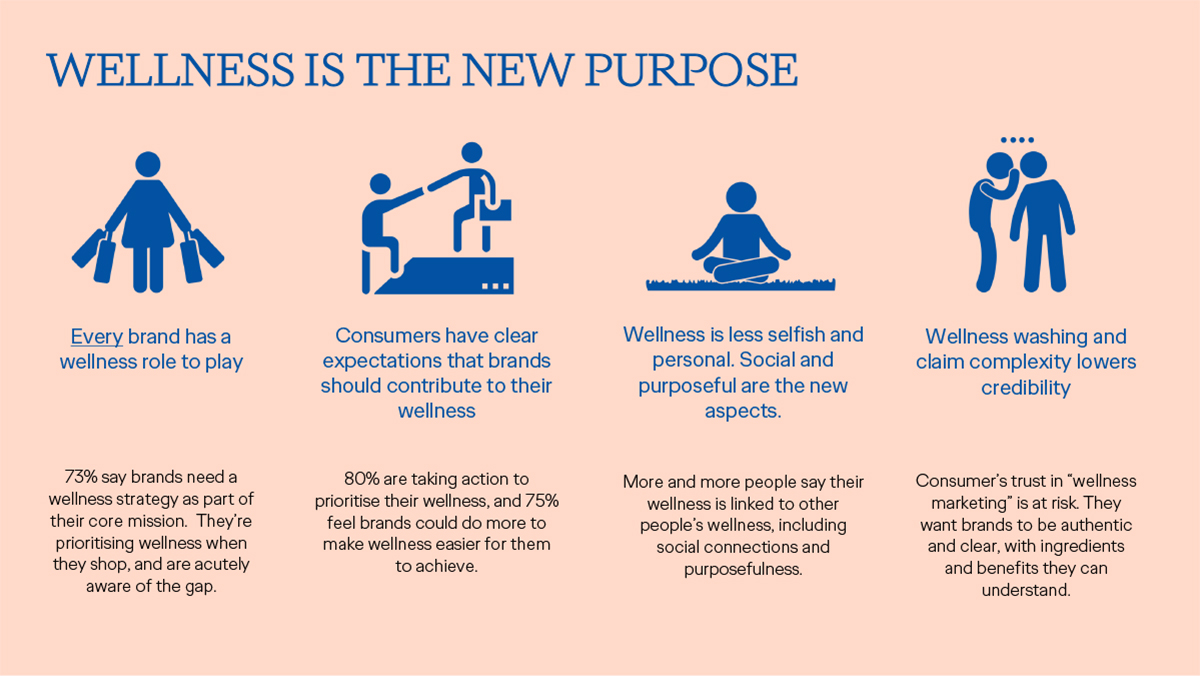Consumers expect wellness offerings from all brands
The global wellness industry is growing twice as fast as the global economy as a whole. According to Ogilvy's "Wellness Gap" study, wellness is now seen by 73 percent of global consumers as an essential component of a successful and sustainable brand strategy.

The Ogilvy study reveals for the first time the gap between consumer wellness expectations and brand performance, and analyzes and quantifies it across seven key sectors: food, snack, skincare, airlines, hotels, automotive and banking. The study is designed to enable companies to close this gap and consequently seize the opportunities for growth in the markets.
2020 is in the name of wellness
The global pandemic has led to world-wide restrictions and lockdowns and has brought the epitome of wellness ever closer to center stage. In 2020, nearly 70 percent of the Swiss say wellness is very or extremely important to them. These numbers come as no surprise. And in the future, consumers will demand even more. 82 percent of the Swiss surveyed would like to improve their wellness in the future. 67 percent even see it as the core task of brands to communicate wellness. In addition, wellness offers enormous potential for exploitation, because currently only 28 percent of respondents feel that wellness is handled as a priority by brands.
There are hardly any exceptional markets. The potential for growth is also very high in the wellness-intensive food and skin care industries, which have seen countless wellness innovations in recent years. According to Swiss consumers, only 27 percent feel that food brands are doing everything they can to help their customers achieve wellness. For skin care brands, at least 45 percent feel that way.

Wellness as a revolutionary
Marion McDonald, Ogilvy Global Lead in Health & Wellness Practices, is upbeat: "The fact that any brand can be a wellness brand today opens a great many new doors. Wellness has established itself as a tangible benefit in many ways and offers brands the opportunity for double-digit growth - as long as consumer expectations are perceived and met and the wellness gap is increasingly closing." Martin Keller, Health & Wellness Director at Ogilvy Switzerland, also sees wellness as a revolutionary: "Wellness has created new conversations, aspirations and goals - both for companies and individuals. It has become the inspiration for brands, products, services and experiences, and is increasingly becoming the linchpin of innovative strategies, businesses and portfolios. This revolution is already evident in certain industries, such as food and beverage."
The study also makes clear that wellness has no limitations and can help any brand to grow. Wellness has long since ceased to be a luxury good - and the Swiss agree on this. More than 50 percent of respondents believe that brands should consider wellness aspirations as a core mission. Wellness brands offer consumers many advantages, for example, the majority of the Swiss rate them as more environmentally conscious and more price-friendly compared to non-wellness brands.
Wellness should be social and purposeful
Healthy meals, restful sleep and sufficient time to relax are old tried-and-tested factors of wellness. In 2020, these will be supplemented with new social values.
According to the Ogilvy study, the Swiss associate wellness in 2020 with four facets: physical, psychological, social and purposeful. Society is changing, and the quest for connectedness is intensifying as a result. Nowadays, consumers do not want to "exclusively" consume, but to improve the world with their actions. This is clearly reflected in their perception of wellness. For 77 percent of the Swiss, wellness promotes their sense of harmony and balance; 66 percent feel it is essential that wellness brands make their positive contribution, and 50 percent want to be able to see meaning in wellness.
In particular, activating a brand purpose offers brands new opportunities to strengthen their bond with consumers. According to the study, an authentic and honest social brand purpose based on wellness attributes leads to rich and personal customer loyalty and sustainably improves social commerce.
Authenticity gap to take full advantage of growth opportunities
"Wellness-washing" is also no longer a foreign word in the wellness industry, which is also reflected in the Ogilvy study. Swiss consumers want authentic and honest stories, products with easily understandable ingredients and credible benefits. Keeping promises is seen as particularly critical by consumers, with only 30 percent considering the brands' currently promised wellness claims to be credible. The same applies in the wellness industry: only those who create trust can make a name for themselves.
The growth prospects of the wellness industry are very promising. Compared with other industries, Covid-19 has by no means had negative consequences - on the contrary, aspiration for wellness has risen sharply in times of the pandemic. However, consumers are demanding an optimized and more credible offering with the long-term goal of finally closing the wellness gap.

Within the framework of the "Wellness Gap" study Ogilvy surveyed 7000 consumers from 14 countries on four continents in April 2020 about their wellness perceptions.








